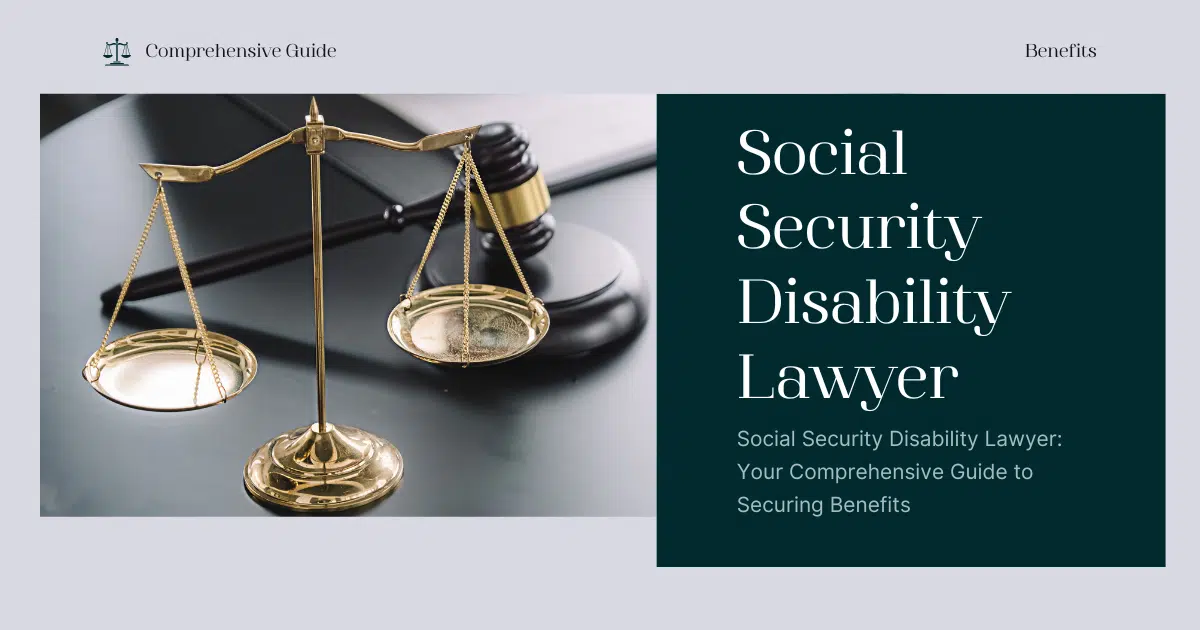Navigating the labyrinth of Social Security Disability Insurance (SSDI) can be overwhelming. With intricate regulations and strict eligibility criteria, securing your rightful benefits often requires expert guidance. This is where a Social Security Disability lawyer becomes an invaluable ally. In this comprehensive guide, we’ll delve into the pivotal role these legal professionals play, offer essential tips, and answer common questions to empower you on your journey toward financial stability.
Table of Contents
- Why You Need a Social Security Disability Lawyer
- How to Choose the Right Lawyer
- The Application Process: Step by Step
- Common Reasons for Denial and How to Avoid Them
- Frequently Asked Questions
- Tips for a Successful Application
- The Emotional Impact and How a Lawyer Can Help
- Real-Life Success Stories
- Conclusion
- References
Why You Need a Social Security Disability Lawyer
Applying for SSDI isn’t just filling out forms; it’s a legal process that demands meticulous attention to detail. Here’s why enlisting a lawyer is beneficial:
Expertise in Complex Regulations
Social Security laws are complex and ever-changing. A seasoned lawyer stays abreast of the latest regulations, ensuring your application complies with all requirements.
Maximizing Your Chances of Approval
Statistics from the Social Security Administration reveal that initial applications have a high denial rate. A lawyer can help present your case effectively, increasing the likelihood of approval.
Handling Appeals and Hearings
If your application is denied, a lawyer can represent you in appeals and hearings, advocating on your behalf to overturn the decision.
How to Choose the Right Lawyer
Selecting the right legal representation is crucial. Consider these factors:
Experience and Specialization
Opt for lawyers specializing in Social Security Disability cases. Their focused expertise translates to a deeper understanding of the system.
Track Record of Success
Research their history. A lawyer with a high success rate in securing benefits for clients is a promising choice.
Transparent Fee Structure
Most SSDI lawyers work on a contingency basis, meaning they only get paid if you win your case. Ensure their fees comply with Social Security regulations.
The Application Process: Step by Step
Understanding the SSDI application process can demystify it. Here’s a breakdown:
Step 1: Determine Eligibility
You must have a medical condition that meets the SSA’s definition of disability and sufficient work credits.
Step 2: Gather Documentation
Collect medical records, employment history, and personal identification documents.
Step 3: Complete the Application
Your lawyer can help accurately fill out the necessary forms, either online or at a local SSA office.
Step 4: Application Review
The SSA reviews your application, which can take several months.
Step 5: Decision and Potential Appeal
If approved, benefits commence. If denied, your lawyer can file an appeal within 60 days.
Common Reasons for Denial and How to Avoid Them
Understanding why applications are denied can help you avoid common pitfalls.
Incomplete Information
Ensure all forms are thoroughly completed with accurate information.
Insufficient Medical Evidence
Provide comprehensive medical records that substantiate your disability.
Failure to Follow Treatment
Compliance with prescribed treatments is essential unless valid reasons are documented.
Frequently Asked Questions
Navigating the Social Security Disability process can be overwhelming, and many people have questions about how a Social Security Disability lawyer can help. Below are some of the most common questions to provide clarity and guidance. Whether you’re just starting your application or facing an appeal, these answers will help you understand the role of a lawyer and the steps to secure your benefits.
Q: How long does the SSDI application process take?
A: The initial decision typically takes 3-5 months. However, appeals can extend the process significantly.
Q: Can I work while applying for SSDI?
A: You can work, but earnings must be below the SSA’s substantial gainful activity threshold.
Q: What if I can’t afford a lawyer?
A: SSDI lawyers are paid from back benefits if you win. Upfront fees are usually not required.
Tips for a Successful Application
- Be Honest and Thorough: Provide complete and truthful information to avoid delays or denials.
- Keep Detailed Records: Maintain organized medical and employment records.
- Stay Informed: Regularly check the status of your application and respond promptly to SSA requests.
The Emotional Impact and How a Lawyer Can Help
Dealing with a disability is challenging enough without the added stress of legal procedures. A compassionate lawyer provides not only legal support but also alleviates the emotional burden by handling the complexities of your case.
Real-Life Success Stories
Hearing about others’ successes can be encouraging.
Sarah’s Journey
After two denials, Sarah enlisted a Social Security Disability lawyer who helped her gather additional medical evidence. She won her appeal and secured her benefits.
John’s Appeal Victory
John’s initial application was denied due to incomplete documentation. His lawyer identified the gaps, and upon resubmission, John received approval.
Conclusion
Securing SSDI benefits is a critical step toward financial stability when you’re unable to work due to a disability. A Social Security Disability lawyer can be the key to unlocking these benefits, guiding you through each step with expertise and compassion. Don’t navigate this complex journey alone—seek professional assistance to maximize your chances of a favorable outcome.
References
- Social Security Administration
- Disability Benefits Help
- National Organization of Social Security Claimants’ Representatives
Empower yourself today by consulting a Social Security Disability lawyer and take the first step toward securing your future.
